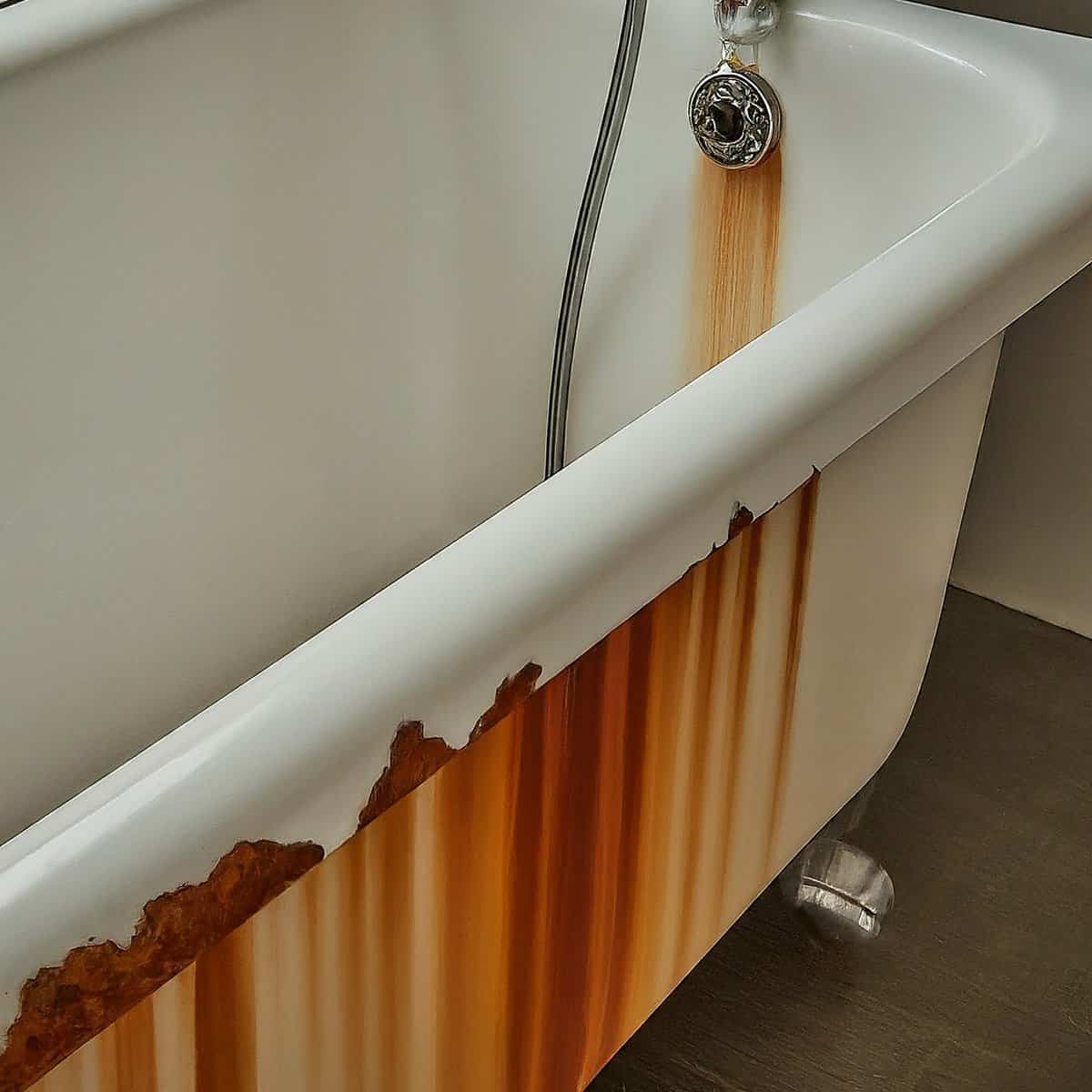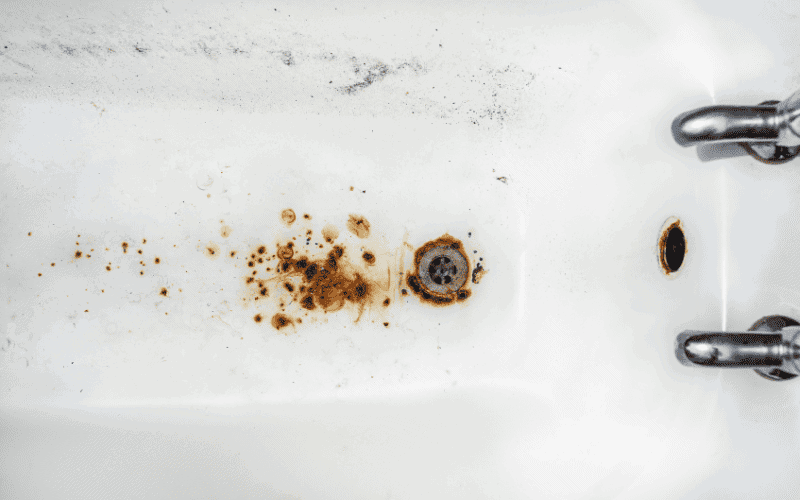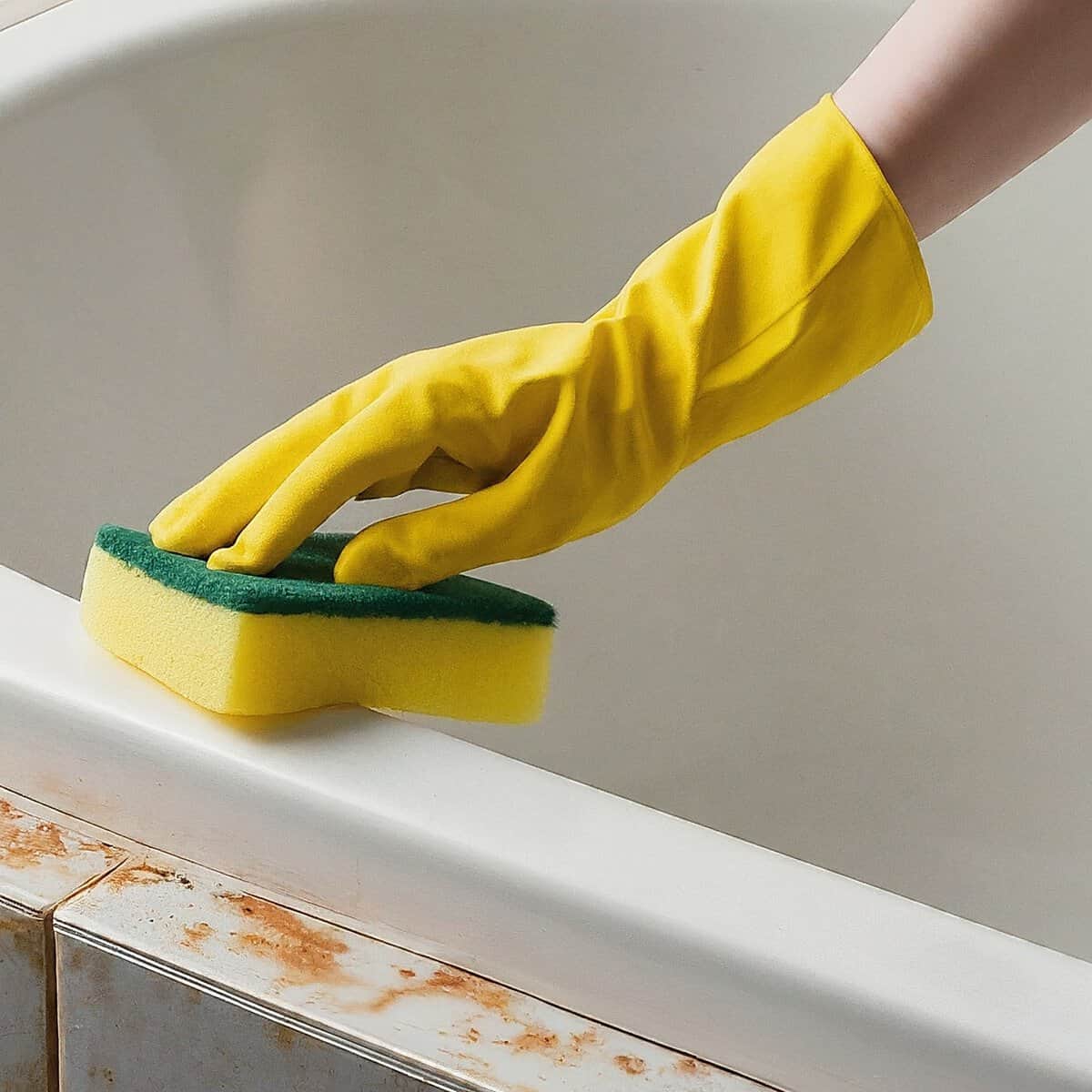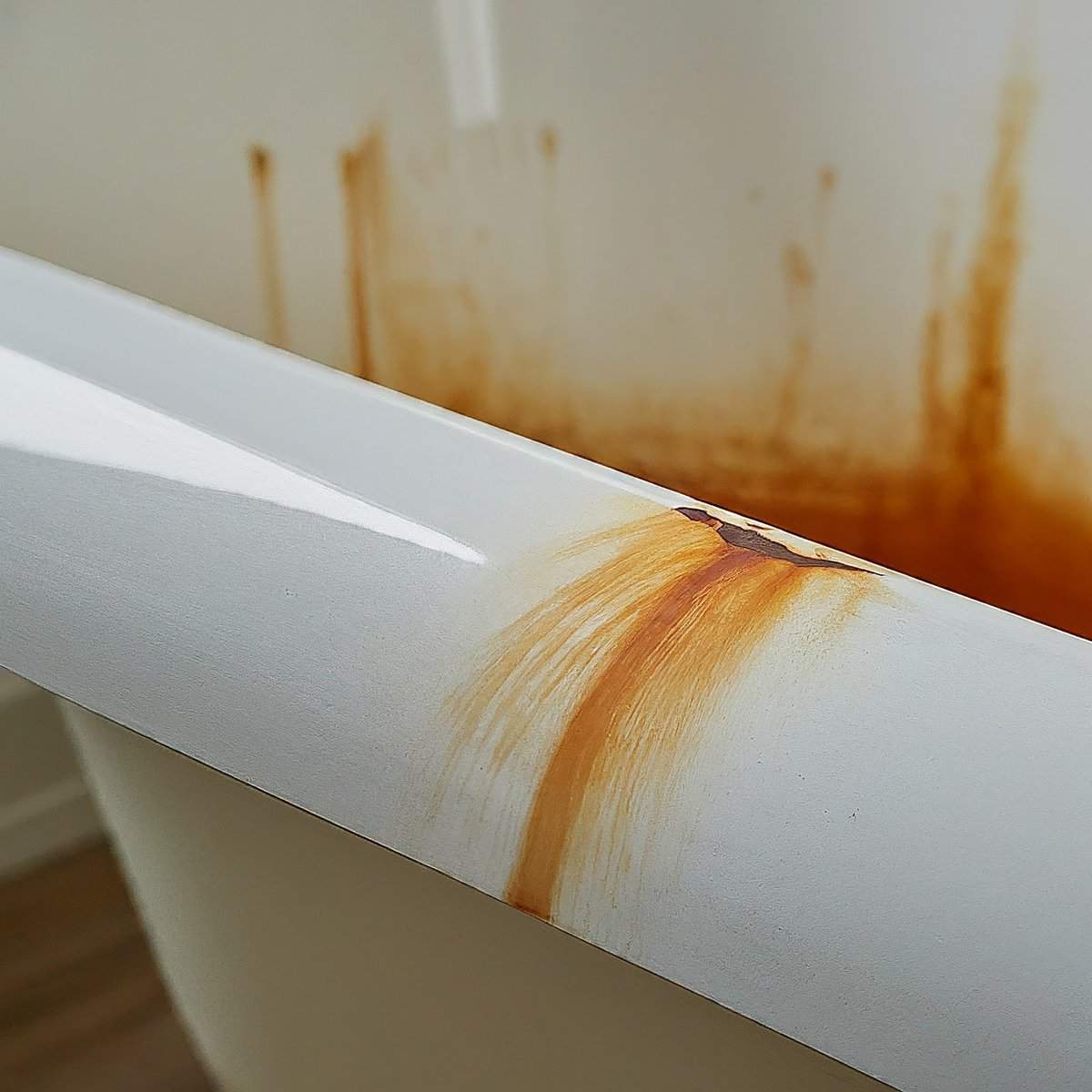To remove rust from a bathtub, you can use a variety of methods such as applying a paste of baking soda and vinegar, scrubbing with a pumice stone, using lemon juice and salt, or utilizing commercial rust removers like Bar Keepers Friend or Shaw’s Pads.
Say Goodbye to Rust: The Ultimate Guide to Removing Rust from Your Bathtub
Rust in bathtubs is a common problem that many homeowners face. Understanding the causes of rust in bathtubs is essential in order to effectively remove and prevent it from reoccurring. One of the main causes of rust in bathtubs is the constant exposure to water and moisture.
When water sits on the surface of the bathtub for extended periods of time, it can cause the metal to oxidize and form rust. This is especially true for older bathtubs that may have worn enamel or porcelain coatings, leaving the metal underneath vulnerable to rusting.
Additionally, the use of harsh cleaning chemicals and abrasive scrubbing tools can also contribute to the formation of rust in bathtubs. These chemicals and tools can strip away the protective coatings on the bathtub, making it more susceptible to rust.
Another common cause of rust in bathtubs is the presence of iron and other minerals in the water supply. When water with high mineral content comes into contact with the metal surface of the bathtub, it can lead to the formation of rust stains. This is particularly common in areas with hard water, where the mineral deposits can build up over time and cause rust to develop.
Furthermore, if the bathtub has any cracks or chips in the enamel or porcelain coating, it can provide an entry point for water to reach the metal surface and cause rust to form. Understanding these causes of rust in bathtubs is crucial for effectively addressing the issue and preventing it from reoccurring in the future.
Key Takeaways
- Rust in bathtubs can be caused by factors like hard water, metal fixtures, and moisture.
- Methods for removing rust stains from bathtubs include using vinegar, lemon juice, baking soda, and commercial rust removers.
- Prevent future rust build-up by regularly cleaning and drying your bathtub, using a rust-resistant coating, and fixing any leaks or drips.
- If DIY methods don’t work, consider seeking professional help for severe rust issues in your bathtub.
- Regular maintenance and prompt rust removal can help keep your bathtub rust-free.
The Best Methods for Removing Rust Stains from Bathtubs
When it comes to removing rust stains from bathtubs, there are several effective methods that can be used. One of the most popular methods for removing rust stains from bathtubs is using a mixture of baking soda and vinegar.
This natural and non-toxic solution can be made by mixing equal parts of baking soda and vinegar to form a paste. The paste can then be applied to the rust stains on the bathtub and left to sit for a few hours before scrubbing it off with a sponge or brush. The mild abrasive nature of baking soda, combined with the acidic properties of vinegar, makes this method effective at breaking down and removing rust stains from bathtubs.
Another effective method for removing rust stains from bathtubs is using lemon juice and salt. The citric acid in lemon juice acts as a natural rust remover, while the abrasive nature of salt helps to scrub away the rust stains.
To use this method, simply sprinkle salt over the rust stains on the bathtub and then squeeze lemon juice over the salt. Allow the mixture to sit for a few hours before scrubbing it off with a sponge or brush. This method is not only effective at removing rust stains, but it also leaves behind a fresh citrus scent in the bathtub.
Additionally, there are commercial rust removal products available on the market that are specifically designed to remove rust stains from bathtubs. These products typically contain strong chemicals that can effectively break down and remove rust stains, but they should be used with caution and according to the manufacturer’s instructions.
Natural and DIY Solutions for Rust Removal
In addition to the baking soda and vinegar, as well as lemon juice and salt methods mentioned above, there are several other natural and DIY solutions for removing rust stains from bathtubs. One popular method is using a paste made from cream of tartar and hydrogen peroxide.
This mixture can be applied to the rust stains on the bathtub and left to sit for a few hours before scrubbing it off with a sponge or brush. The abrasive nature of cream of tartar, combined with the oxidizing properties of hydrogen peroxide, makes this method effective at removing rust stains from bathtubs.
Another natural solution for removing rust stains from bathtubs is using a potato and dish soap. The oxalic acid in potatoes acts as a natural rust remover, while the dish soap helps to break down and lift away the rust stains.
To use this method, simply cut a potato in half and dip it in dish soap before rubbing it over the rust stains on the bathtub. Allow the potato to sit for a few hours before scrubbing it off with a sponge or brush. This method is not only effective at removing rust stains, but it is also gentle on the bathtub surface and safe for use around children and pets.
Using Commercial Rust Removers: What You Need to Know
| Method | Effectiveness | Cost |
|---|---|---|
| Vinegar and Baking Soda | High | Low |
| Lemon Juice and Salt | Medium | Low |
| Commercial Rust Remover | High | Medium |
| Steel Wool or Sandpaper | High | Low |
While natural and DIY solutions can be effective at removing rust stains from bathtubs, there are also commercial rust removers available on the market that can provide quick and powerful results. These products typically contain strong chemicals that are designed to break down and remove tough rust stains from bathtubs. When using commercial rust removers, it is important to follow the manufacturer’s instructions carefully and take proper safety precautions. This may include wearing gloves, eye protection, and ensuring adequate ventilation in the bathroom.
It is also important to consider the type of bathtub material when using commercial rust removers. Some products may be too harsh for certain bathtub materials, such as acrylic or fiberglass, and could cause damage to the surface.
Before using a commercial rust remover, it is recommended to test it on a small, inconspicuous area of the bathtub to ensure that it does not cause any damage. Additionally, it is important to thoroughly rinse and clean the bathtub after using a commercial rust remover to remove any residue and ensure that it is safe for use.
Preventing Future Rust Build-Up in Your Bathtub
Once you have successfully removed rust stains from your bathtub, it is important to take steps to prevent future build-up. One of the best ways to prevent future rust build-up in your bathtub is by keeping it clean and dry.
After each use, be sure to thoroughly dry the bathtub with a towel or squeegee to remove any standing water. This will help prevent water from sitting on the surface of the bathtub and causing rust to form.
Additionally, using a protective coating or sealant on your bathtub can help prevent future rust build-up. There are several products available on the market that are specifically designed to protect bathtubs from rust and corrosion.
These products can be applied to the bathtub surface to create a protective barrier that helps repel water and prevent rust from forming. It is important to follow the manufacturer’s instructions when applying these products and reapply them as needed to maintain their effectiveness.
Tips for Maintaining a Rust-Free Bathtub
In addition to keeping your bathtub clean and dry, there are several other tips for maintaining a rust-free bathtub. One tip is to avoid using harsh cleaning chemicals and abrasive scrubbing tools that can strip away protective coatings on the bathtub and make it more susceptible to rust. Instead, opt for gentle cleaning solutions and non-abrasive tools that will effectively clean the bathtub without causing damage.
Another tip for maintaining a rust-free bathtub is to regularly inspect it for any signs of wear or damage. If you notice any cracks or chips in the enamel or porcelain coating, be sure to repair them promptly to prevent water from reaching the metal surface underneath and causing rust to form.
Additionally, consider installing a water softener if you live in an area with hard water to help reduce mineral deposits that can lead to rust build-up in your bathtub.
When to Seek Professional Help for Severe Rust Issues in Your Bathtub
While many rust issues in bathtubs can be effectively addressed using natural and DIY solutions, there are some instances where professional help may be necessary. If you have severe rust issues in your bathtub that cannot be removed using home remedies, it may be time to seek professional help. A professional plumber or bathtub refinishing specialist can assess the extent of the rust damage and recommend the best course of action for addressing it.
In some cases, severe rust issues may require refinishing or reglazing the bathtub to restore its appearance and prevent further corrosion. This process involves stripping away the old finish, repairing any damage, and applying a new coating to protect the bathtub from future rust build-up. While this may be a more costly option than DIY solutions, it can provide long-lasting results and extend the life of your bathtub.
Conclusion
In conclusion, understanding the causes of rust in bathtubs is essential for effectively removing and preventing it from reoccurring. There are several methods for removing rust stains from bathtubs, including natural and DIY solutions as well as commercial rust removers.
Preventing future rust build-up in your bathtub involves keeping it clean and dry, using protective coatings or sealants, and avoiding harsh cleaning chemicals and abrasive tools. By following these tips and knowing when to seek professional help for severe rust issues, you can maintain a rust-free bathtub for years to come.
FAQs
What causes rust in a bathtub?
Rust in a bathtub is typically caused by prolonged exposure to water and moisture, which can lead to the metal surface of the bathtub corroding and forming rust.
How can I remove rust from my bathtub?
There are several methods for removing rust from a bathtub, including using commercial rust removers, natural remedies such as vinegar and baking soda, or abrasive tools like steel wool or sandpaper.
Are there any home remedies for removing rust from a bathtub?
Yes, there are several home remedies for removing rust from a bathtub, including using vinegar, lemon juice, baking soda, or a paste made from cream of tartar and hydrogen peroxide.
Is it possible to prevent rust from forming in the bathtub?
Yes, you can prevent rust from forming in your bathtub by regularly cleaning and drying the surface, using a rust-resistant coating, and addressing any leaks or water damage promptly.
Can rust in a bathtub be harmful to health?
Rust in a bathtub is not typically harmful to health, but it can be unsightly and may indicate underlying issues with the bathtub’s structure or plumbing. It is important to address rust promptly to prevent further damage.
Originally posted 2024-06-04 17:24:37.




